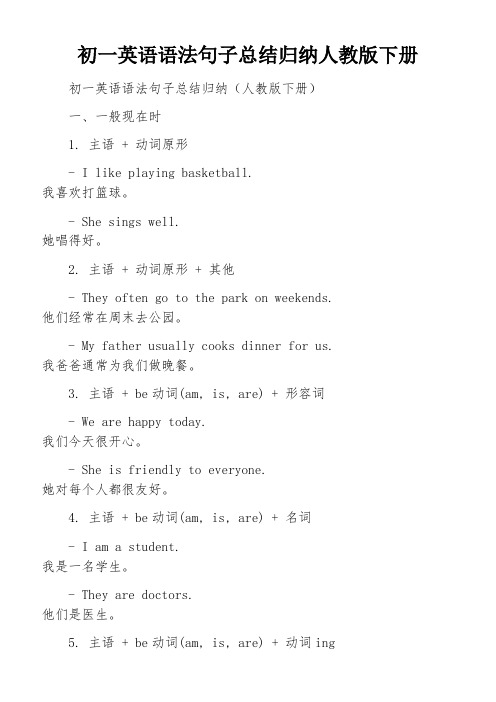初一下册一般将来时
- 格式:doc
- 大小:48.50 KB
- 文档页数:7

一般将来时知识点七年级一般将来时是英语语法的一部分,用于表示将来发生的动作或事件。
在七年级的学习中,学生们需要掌握一般将来时的用法,从而能够正确地表达未来的计划和想法。
本文将为你介绍一般将来时的知识点。
1.构成一般将来时由“will + 动词原形”构成,例如:I will study hard for the exam.我们也可以使用“be going to + 动词原形”来表达一般将来时,例如:She is going to visit her grandparents this weekend.2.用法(1)表示未来的计划和安排。
例如:We will have a picnic next Sunday.(2)表示预测或猜测。
例如:It will rain tomorrow.(3)表示意图、打算或决心。
例如:I will help you with your homework.(4)表示请求或提供帮助。
例如:Will you please lend me your pen?(5)表示愿望、要求或命令。
例如:I hope you will study hard.3.注意事项(1)will 通常用于第一人称和第二人称,而“be going to”通常用于第三人称。
例如:I will take the bus home.You will enjoy the party.He is going to buy a new car.(2)在口语中,我们可以缩略将来时形式。
例如:I'll call you later.We're going to the beach this weekend.(3)应该避免在句子中使用简单现在时代替将来时。
例如:Wrong: She flies to New York next week. Right: She will fly to New York next week.4.例子下面是一些使用一般将来时的例子:I will buy a new phone next month. Sandy is going to take French lessons.Will you go to the concert with me?They will have a party on Friday.I hope you will enjoy your vacation.总结在七年级的英语学习中,学生们需要掌握一般将来时的用法。

初中英语-一般将来时详解初中英语一般将来时(Simple Future Tense)用于表示将来某个时间会发生的动作或存在的状态。
下面是初中英语一般将来时的详细讲解:一、构成:1.一般将来时的肯定句结构为:主语 + will + 动词原形2.一般将来时的否定句结构为:主语 + will not (won't) + 动词原形3.一般将来时的疑问句结构为:Will + 主语 + 动词原形?二、用法:1. 表示未来的事实、计划或打算:①I will visit my grandparents next week.(我下周会去看望我的祖父母。
)②We will have a party on Saturday.(我们周六要开个派对。
)2. 表示预测或推测:①It will rain tomorrow.(明天会下雨。
)②He will probably be late for the meeting.(他可能会迟到会议。
)3. 表示意愿、请求、建议等:①Will you please help me with my homework?(你能帮我做作业吗?)②I will do my best to help you.(我会尽力帮助你。
)4. 表示承诺或威胁:①I will always love you.(我会永远爱你。
)②If you don't listen to me, I will tell the teacher.(如果你不听我的话,我会告诉老师。
)注意事项:1. 在一般将来时中,主语通常是第一人称(I/we)或第三人称(he/she/it/they),而第二人称(you)在肯定句和否定句中都是一样的。
2. 一般将来时的疑问句需要将助动词will放在句首。
3. 在一般将来时中,表示将来时间的副词或时间状语可以与will连用,如tomorrow, next week等。
三、总结:初中英语一般将来时用于表示未来某个时间会发生的动作或存在的状态,可以用于表达事实、计划、预测、意愿、请求等。



初一英语语法句子总结归纳人教版下册初一英语语法句子总结归纳(人教版下册)一、一般现在时1. 主语 + 动词原形- I like playing basketball.我喜欢打篮球。
- She sings well.她唱得好。
2. 主语 + 动词原形 + 其他- They often go to the park on weekends.他们经常在周末去公园。
- My father usually cooks dinner for us.我爸爸通常为我们做晚餐。
3. 主语 + be动词(am, is, are) + 形容词- We are happy today.我们今天很开心。
- She is friendly to everyone.她对每个人都很友好。
4. 主语 + be动词(am, is, are) + 名词- I am a student.我是一名学生。
- They are doctors.他们是医生。
5. 主语 + be动词(am, is, are) + 动词ing- He is playing football in the park.他正在公园里踢足球。
- We are watching a movie at home.我们正在家里看电影。
二、一般过去时1. 主语 + 动词过去式- I listened to music yesterday.昨天我听音乐。
- She played chess with her friends last night.昨晚她和朋友下棋。
2. 主语 + be动词(was, were) + 形容词- He was tired after school.放学后他感到累。
- They were happy at the party.派对上他们很快乐。
3. 主语 + be动词(was, were) + 名词- I was a student two years ago.两年前我是一名学生。

一般将来时一般将来时表示将来要发生的事,will/shall和be going to可用来表示一般将来时。
一、will/shall表示一般将来时★will/shall用于一般将来时态中时,其后要接动词原形。
需要注意的是,shall只用于主语是第一人称(I或we)的句子,而will可用于主语是各种人称的句子。
例如:I will/shall go to Shenzhen next week.我下周将去深圳。
My brother will go to the cinema tomorrow morning.我兄弟明天早上将去看电影。
Lisa will visit her grandparents at the weekend.周末丽萨将去看望她的祖父母。
★will/shall表示一般将来时的否定句和一般疑问句及答语will/shall表示一般将来时的否定句是直接在will/shall 后加not。
例如:My brother will go to the cinema tomorrow morning.→My brother will not go to the cinema tomorrow morning.Lisa will visit her grandparents at the weekend.→Lisa will not visit her grandparents at the weekend.★一般疑问句是将will/shall提前至句首,其他语序不变,句末用问号。
答语通常用Yes, 主语+ will. / No, 主语+ will not. 例如:My brother will go to the cinema tomorrow morning.→—Will your brother go to the cinema tomorrow morning?—Yes, he will. / No, he will not.Lisa will visit her grandparents at the weekend.→—Will Lisa visit her grandparents at the weekend?—Yes, she will. / No, she will not.【拓展】Shall I ...? 和Shall we ...?常用来表示请求、询问或征求对方的意见等。
“一般将来时”的几种语法形式初中英语中暗示一般将来时的语法形式有四种:shall/will+动词原形;be going to +动词原形;现在进行时和一般现在时。
现将这四种形式分述如下:一. shall/will+动词原形1. will可用于所有人称,但shall 仅暗示单纯将来时,用于第一人称I和we,作为will的一种替代形式。
以You and I为主语时凡是避免用shall。
例如:He will be back soon. 他很快就会回来。
I shall/will be free on Sunday. 星期天我有空。
You and I will work in the same factory. 你和我将在同一工厂工作。
2. will , shall可用来预言将来发生的事。
如说出我们设想会发生的事,或者请对方预言将要发生什么事。
例如:It will rain tomorrow. 明天将要下雨。
3. will , shall除可暗示单纯的将来时以外,还可以带有意愿的色彩,仍指的是将来。
例如:I’ll buy you a bicycle for your birthday. 你过生日时,我给你买一辆自行车。
(暗示允诺)Will you open the door for me please? 请你帮我开门好吗?(暗示请求)Shall I get your coat for you? 我可感觉你拿外套吗?(暗示提议)二. be going to+动词原形1. 暗示说话人按照现在已有的迹象,判断将要或即将发生某种情况。
这类句子的主语可以是人,也可是物。
例如:There is going to be a football match in our school tomorrow afternoon. 明天下午我们学校将有一场足球赛。
(已有告示)I feel terrible . I think I’m going to die. 我感应难受极了,我想我快不行了。
一般将来时的讲解与练习Ⅰ概念:⒈表示将来某个时间要发生的动作或存在的状态,⒉也表示将来经常或反复发生的动作,常与表示将来的时间状语连用。
例如:tomorrow , tomorrow morning / afternoon …,the day after tomorrow , next year , next month … , from now on (从现在开始),in an hour (一小时后),in two days / weeks ,soon, in the future…等。
如:He is going to be a doctor in the future.(将存在的状态)I am going to make a card by myself tomorrow.(将发生的动作)They will work from Monday to Friday next week.(将经常反复发生的动作)Ⅱ谓语结构:1.肯定句:主语+ will/be going to + 动词原形+ 其他。
注:will和be going to 的区别:⑴ be going to表示近期、眼下就要发生的事情;will表示的将来时间则较远一些。
如:He is going to write a letter tonight.He will write a book one day.⑵ be going to 表示根据主观判断将来肯定发生的事情,will表示客观上将来势必发生的事情。
如:He is seriously ill. He is going to die.He will be twenty years old.⑶ be going to 含有“计划,准备”的意思,而will 则没有这个意思。
如:She is going to lend us her book.He will be here in half an hour.⑷.在有条件从句的主句中,一般不用be going to, 而多用will。
初中英语一般将来时讲解初中英语一般将来时(Simple Future Tense)用于表示将来某个时间会发生的动作或存在的状态。
下面是初中英语一般将来时的详细讲解:一、构成:1.一般将来时的肯定句结构为:主语 + will + 动词原形2.一般将来时的否定句结构为:主语 + will not (won't) + 动词原形3.一般将来时的疑问句结构为:Will + 主语 + 动词原形?二、用法:1. 表示未来的事实、计划或打算:①I will visit my grandparents next week.(我下周会去看望我的祖父母。
)②We will have a party on Saturday.(我们周六要开个派对。
)2. 表示预测或推测:①It will rain tomorrow.(明天会下雨。
)②He will probably be late for the meeting.(他可能会迟到会议。
)3. 表示意愿、请求、建议等:①Will you please help me with my homework?(你能帮我做作业吗?)②I will do my best to help you.(我会尽力帮助你。
)4. 表示承诺或威胁:①I will always love you.(我会永远爱你。
)②If you don't listen to me, I will tell the teacher.(如果你不听我的话,我会告诉老师。
)注意事项:1. 在一般将来时中,主语通常是第一人称(I/we)或第三人称(he/she/it/they),而第二人称(you)在肯定句和否定句中都是一样的。
2. 一般将来时的疑问句需要将助动词will放在句首。
3. 在一般将来时中,表示将来时间的副词或时间状语可以与will连用,如tomorrow, next week等。
三、总结:初中英语一般将来时用于表示未来某个时间会发生的动作或存在的状态,可以用于表达事实、计划、预测、意愿、请求等。
第三讲:一般将来时一、定义:一般将来时表示将来某一时刻的动作或状态,或将来某一段时间内经常的动作或状态.1.表示将来某一时刻的动作或状态:e.g。
She will buy a new bike tomorrow.We will drive to the park next week.I shall visit my grandparents this weekend。
They are going to play computer games this evening.I am going to have a big meal。
2。
将来某一段时间内经常的动作或状态:e.g。
He is gong to have a big house next year .She will have a daughter.The cat will have a master。
The dog will have a house.二、常与一般将来时连用的词:1. 时间状语系列:next Tuesdaynext weeknext yearthe coming Sundaythis afternoontomorrowtonightin a few minutesin the futurein five yearsfrom now onsoon三、一般将来时的构成1. will/shall的一般将来时构成:主语 + will/shall + 动词原形+其它I will/shall go to Beijing next week.主语是第一人称时—--—— shall主语为任何人称时——--- will否定句的构成: 主语 + will/shall not + 动词原形+其它will not = won'tshall not= shan't【活学活用】按照要求改写句子1、My teacher will teach us next term。
be going to 的用法●一般将来时的含义:●一般将来时的结构:●一般将来时的标志性词语:举例:我明天将要去上学了。
_____________________________________Peter下个星期就要去了。
_____________________________________●be going to 将来时的疑问句和否定句怎么用呢?述句变疑问句要把___________提前,第一二人称互换,句号变问号,其他不变述句变否定句直接在___________后面加______be动词的否定形式缩写:is not----- are not----- (am not不可以缩写)举例:我不打算去钓鱼了。
____________________________ 你准备下周要干嘛呢?___________________________ ●be going to 将来时的肯定以及否定回答是怎么样的?含人称的肯定回答:Yes, _______/ Yes,_______/ Yes, __________等等含人称的否定回答:No,_______/ No,_______/ No,_______/等等其他的单数肯定回答:___________ 否定回答:_________________复数肯定回答:___________ 否定回答:_______________除了there is / there are 来提问其回答是________________________举例:(把下列问句的肯定以及否定回答写出来)Is he going to play football with you ?_____________ _______________Is Tom going to clean the room this afternoon?____________ _______________Is the cat going to catch a mouse?___________________ _________________Are there going to a meeting tomorrow?___________________ _____________Are you going to see a film with me?______________________ _______________如果要询问别人打算在将来某一时间做什么应该怎么提问呢?一般用What…..do? 具体怎么用下面举例子他今天下午要做什么?_________________________你这个周末要做什么?_________________________他们今天晚上要做什么?_________________________●根据询问的具体情况,可以在句首加不同的疑问词例如when( ) where( ) who( )how( ) what time( ) which( )海伦什么时候去看望她在中国的女?____ _____ Helen ______ _____ see her granddaughter in China?他要在哪里办生日派对?_____ ______ he ______ _____ hold his birthday party?●如果表示计划到某地区,由于谓语动词go和going重复,一般可以只说“be going to +地点”例如我们要去度假______________________________单项选择题1we__________have a picnic.A.is going toB.are going toC.are going2.He is going to________basketball.A.palyB.palyingC.palys3.They_______going to go to school.A is B.are C.am4.I am going to___________.Agoing swimming B.go swimming C.go to swimming5.She is going to_________ the theatre.A.goB.goesC.go to6.It____going to rain.A is B.am C.are7._________are you going to go to school?-----we are going to go t o shool at7o’clock.A where Bwhen C what8._________is she going to do?------she is going to do her homework.A when Bwhat C who9.______is going to buy some books?------LilyA.where Bwhen Cwho10.It’s going to________I don’t want to paly base ball.A.rainingB.rains Crain11.________are we going to eat?-------At7o’clock.A.whereB.whoC.what12.I am going to________the lake.A.walk aroundB.walked aroundC.walking around13.Are you going to________middle school?----Yes.I’m really excited.A.goB.go to Cgoing14.we are going to__________ Chinese.A.speakB.tellC. say15.when________I going to go to school?-----At7o’clcok.A.isB.amC.are选择合适的词when what where how what time which who-______________ are you going? - I am going to the Great Wall.-_____________ are they going to school? -They go to school by school bus.-_____________ are you going to the museum? –Tomorrow afternoon.-_____________ are we going to buy? –We are going to buy some fruit.-_____________ is she going with? –She is going to Beijing with her mum.完形填空This is my school.It’s No.41.My2name is Miss Gao.My name is Wang Wei.I’m twelve.I’m in3.In4class,we have15boys522girls.The classroom is not ne w,but6clean.It has two doors and six windows.I have a good7 ,Mike.He’s8.He is eleven.9in the same class.Mike has a sister.10name is Mary.She is five.She isn’t a student.()1.A.School Middle B.Middle schoolC.middle schoolD.Middle School()2.A.teacher B.teacher’sC.friend’sD.student’s()3.A.Grade1,Class3 B.grade1,Class3C.Class3,Grade1D.class3,grade1()4.A.I B.we C.ours D.our()5.A.and B.or C.but D.are()6.A.it’s B.its C.we’re D.they’re()7.A.teacher B.friend C.class D.school()8.A.America B.boys C.American D.girl()9.A.We’re B.They’re C.I’m D.She’s()10.A.He’s B.She’s C.Her D.His阅读理解There are four people in the Read family.They are Mr Read,Mrs R ead,their son Tom and their daughter Ann.Mr Read is in a black co at and browntrousers.Mrs Read is in a red blouse and a green skirt.The little girl is Ann.She is in a nice red blouse and red shoes.Her hat is black.Th e boy is Ann’s brother.His name is Tom.He is in a grey sweater and blue trousers.()1.How many people are there in Tom’s family?A.threeB.fourC.fiveD.six()2.Ann is Tom’s______.A.brotherB.friendC.classmateD.sister()3.Mr Read is in a____coat and____trousers.A.white,brownB.brown,blackC.brown,blueD.black,brown ()4.Who’s in red blouse?A.Mrs ReadB.TomC.AnnD.A and C()5.How many colours are there in this passage(短文)?A.fiveB.eightC.sevenD.six。